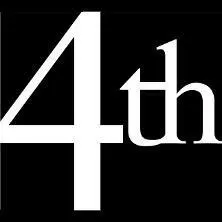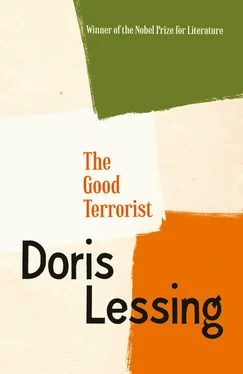Doris Lessing
The Good Terrorist

This novel is entirely a work of fiction. The names, characters and incidents portrayed in it are the work of the author’s imagination. Any resemblance to actual persons, living or dead, events or localities is entirely coincidental.
Fourth Estate
An imprint of HarperCollins Publishers Ltd. 1 London Bridge Street London SE1 9GF
www.harpercollins.co.uk
Previously published in paperback by Grafton Books 1986, Paladin 1990, Flamingo 1993, as a Flamingo Modern Classic 2003, and as a Harper Perennial Modern Classics Edition 2007
First published in Great Britain by Jonathan Cape Ltd 1985
Copyright © Doris Lessing 1985
PS Section Copyright © Sarah O’Reilly 2007, except ‘The Languages We Use’ copyright © Doris Lessing 2007
PS™ is a trademark of HarperCollins Publishers Ltd
Doris Lessing asserts the moral right to be identified as the author of this work
A catalogue record for this book is available from the British Library
All rights reserved under International and Pan-American Copyright Conventions. By payment of the required fees, you have been granted the non-exclusive, non-transferable right to access and read the text of this ebook on-screen. No part of this text may be reproduced, transmitted, downloaded, decompiled, reverse engineered, or stored in or introduced into any information storage and retrieval system, in any form or by any means, whether electronic or mechanical, now known or hereinafter invented, without the express written permission of HarperCollins ebooks
HarperCollins Publishers has made every reasonable effort to ensure that any picture content and written content in this ebook has been included or removed in accordance with the contractual and technological constraints in operation at the time of publication
Source ISBN: 9780007247219
Ebook Edition © JANUARY 2012 ISBN: 9780007381685
Version: 2016-08-25
Cover Page
Title Page
Copyright
Chapter 1
Chapter 2
Chapter 3
Chapter 4
Chapter 5
Chapter 6
Chapter 7
Chapter 8
Chapter 9
Chapter 10
Chapter 11
Chapter 12
Chapter 13
Chapter 14
Chapter 15
Chapter 16
Chapter 17
Chapter 18
Chapter 19
Chapter 20
Chapter 21
Keep Reading
The Grass is Singing
The Golden Notebook
Love, Again
The Fifth Child
P.S.
Q & A: Doris Lessing talks to Sarah O’Reilly about The Good Terrorist
Biographical Sketch
The Languages We Use
About the Author
Also by Doris Lessing
About the Publisher
The house was set back from the noisy main road in what seemed to be a rubbish tip. A large house. Solid. Black tiles stood at angles along the gutter, and into a gap near the base of a fat chimney a bird flew, trailing a piece of grass several times its length.
‘I should think, 1910,’ said Alice, ‘look how thick the walls are.’ This could be seen through the broken window just above them on the first floor. She got no response, but nevertheless shrugged off her backpack, letting it tumble on to a living rug of young nettles that was trying to digest rusting tins and plastic cups. She took a step back to get a better view of the roof. This brought Jasper into vision. His face, as she had expected it would be, was critical and meant to be noticed. For her part she did not have to be told that she was wearing her look , described by him as silly. ‘Stop it,’ he ordered. His hand shot out, and her wrist was encircled by hard bone. It hurt. She faced him, undefiant but confident, and said, ‘I wonder if they will accept us?’ And, as she had known he would, he said, ‘It is a question of whether we will accept them.’
She had withstood the test on her, that bony pain, and he let her wrist go and went on to the door. It was a front door, solid and sure of itself, in a little side street full of suburban gardens and similar comfortable houses. They did not have slates missing and broken windows.
“Why, why, why ?’ asked Alice angrily, addressing the question, probably, to the universe itself, her heart full of pain because of the capacious, beautiful and unloved house. She dragged her backpack by its strap after her and joined him.
‘Profit, of course,’ he said, and pressed the bell, which did not ring. He gave the door a sharp push and they went into a large shadowy hall where stairs went strongly up, turned at a wide landing, and rose out of sight. The scene was illuminated by a hurricane lamp that stood on the floor in a corner. From a side room came the sound of soft drumming. Jasper pushed open this door too. The windows were covered by blankets, leaving not a chink of light. A black youth looked up from his family of drums, his cheeks and teeth shining in candlelight. ‘Hi,’ he said, all his fingers and both feet at work, so that it seemed he was dancing as he sat, or was perhaps on some kind of exercise machine.
This smiling jolly black boy who looked like an advertisement for an attractive holiday in the Caribbean struck Alice’s organ of credibility falsely, and she tucked away a little memo to herself not to forget a first impression of anxiety or even sorrow, which was the real message her nerves were getting from him. She found herself actually on the verge of saying, ‘It’s all right, it’s OK, don’t worry!’ But meanwhile Jasper was demanding, ‘Where’s Bert?’
The black youth shrugged, nonchalantly, still smiling, and did not for one moment stop his energetic attack on his instruments. Jasper’s tight grip on her upper arm took her out of the room into the hall, where Alice said, ‘This place smells.’
‘Well,’ said Jasper, in the clumsily placating way she knew was meant as love, ‘I suppose you’ll put a stop to that.’
At once, feeling her advantage, she said, ‘Don’t forget you’ve been living soft for four years. You’re not going to find it easy after that.’
‘Don’t call me soft,’ he said, and kicked her on the ankle. Not hard, but enough.
This time she went ahead of him and opened a door she felt must be to the kitchen. Light fell on desolation. Worse, danger: she was looking at electric cables ripped out of the wall and dangling, raw-ended. The cooker was pulled out and lying on the floor. The broken windows had admitted rain water which lay in puddles everywhere. There was a dead bird on the floor. It stank. Alice began to cry. It was from pure rage. ‘The bastards,’ she cursed. ‘The filthy stinking fascist bastards.’
They already knew that the Council, to prevent squatters, had sent in the workmen to make the place uninhabitable. ‘They didn’t even make those wires safe. They didn’t even…’ Suddenly alive with energy, she whirled about opening doors. Two lavatories on this floor, the bowls filled with cement.
She cursed steadily, the tears streaming. ‘The filthy shitty swine, the shitty fucking fascist swine…’ She was full of the energy of hate. Incredulous with it, for she had never been able to believe, in some corner of her, that anybody, particularly not a member of the working class, could obey an order to destroy a house. In that corner of her brain that was perpetually incredulous began the monologue that Jasper never heard for he would not have authorized it: But they are people , people did this. To stop other people from living. I don’t believe it. Who can they be? What can they be like? I’ve never met anyone who could. Why, it must be people like Len and Bob and Bill, friends. They did it. They came in and filled the lavatory bowls with cement and ripped out all the cables and blocked up the gas.
Читать дальше













